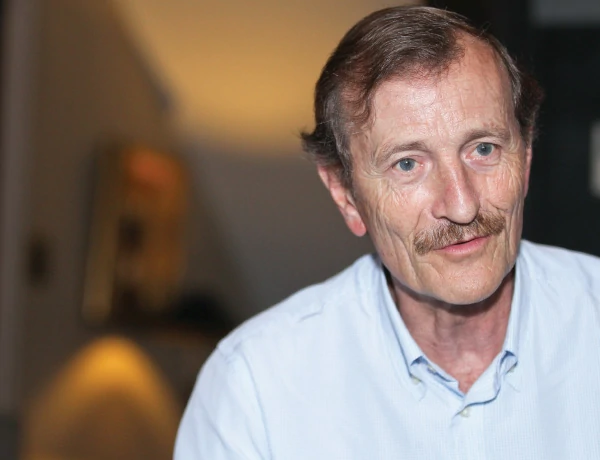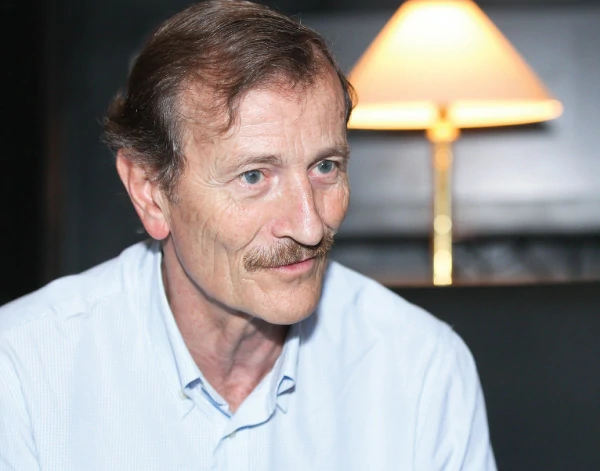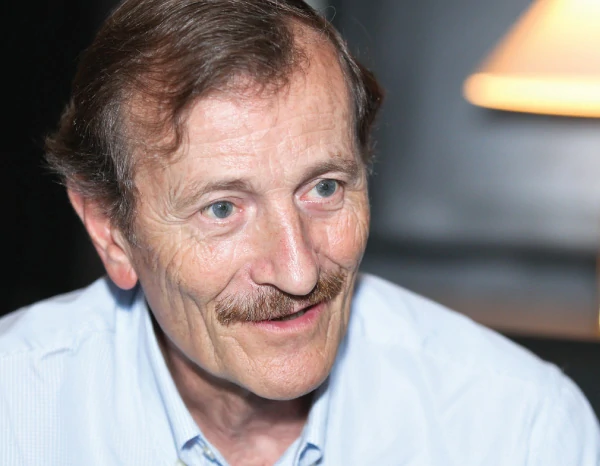
Publicis Groupe is a name that may not strike a chord, however it has remained behind the scenes fuelling its resolute expansions globally over the decades. Today it has evolved into a French-based multinational advertising and communications company that has made its presence known the world over through its vast network of agencies which are now established brand names in their own right. Bertrand Siguier, Executive Vice President of Publicis Worldwide shares his thoughts on a necessary journey that has taken Publicis to the world, one which continues to look to a future of growth.
By Prasadini Nanayakkara
Photography Menaka Aravinda
You have been with the Publicis Groupe for more than 40 years. Today Publicis Groupe is the world’s third largest communications group and also ranked as the second largest media agency in the world. Could you talk about your journey at Publicis Groupe?
Publicis Groupe began as a family-based French agency in 1926 founded by Marcel Bleustein-Blanchet in Paris. When I joined in 1969 it was well-established as the number one French agency with a strength of 500 people involved in advertising and media. During the early 70s a significant change was taking place. Some of our major clients such as Nestle, Renault and Colgate had begun to branch out in Europe and seeking out agencies in those countries. As a result, by 1973 we began opening or buying over agencies throughout Europe.
This is how we developed our business starting with our European-based clients. We expanded in the 80s and completed our European network with an acquisition in London. By 1985 we were the number one advertising group in Europe. Thereafter, very logically we found that we had to take on the world. Europe was not enough since clients like Nestle are international companies, with a very big presence all over the world including, Sri Lanka, India, and South America. We understood that the journey was not over and I was a part of that.
Our Expansions Didn’t Take Place Due To Some Expansionist Dream But To Give Our Clients The Service They Required. Even If A Client Favours You, If Your Presence Is Not There They Will Seek Another Service
You were heavily involved in the globalisation of the Group during the 1990s and today Publicis has one of the largest global networks with more than 200 offices in 82 countries. Could you elaborate on the success of this enterprise?
I was a part of the team with Maurice Levy who has been the Chairman of this group for 25 years. In order to survive we had to branch out, we had no choice and we built our global network either by establishing or acquiring companies. Some of the major acquisitions were Leo Burnett in 2002, the holding company for BCOM3, Saatchi & Saatchi in 1999, media agency Starcom and promotional activity agency Arc Worldwide. It has been a very exciting journey. Although there have been ups and downs it has been very fruitful. Marcel Bleustein-Blanchet who was active until his death in 1997 had this vision that we had to go out into the world, grow and become an important name in the business.
There were many investments and acquisitions to be made and I was a supporter of this idea and I believe it was done at the right moment. When you have a founder who has been in the company since 1926 and you lose him it is quite like losing a member of your family, but we moved on. Today we are the third largest communications group. Initially I was a member of 500 people, now I have a group of 65,000 people from around 20 countries. We are quite well positioned.
To make sure that we develop our brands such as Leo Burnett, Saatchi & Saatchi and improve our digital business, we had to have either organic growth or acquisitions.
Our expansions didn’t take place due to some expansionist dream but to help our clients and give them the service they required. Even if a client favours you, if your presence is not there they will seek another service. This is what motivated our expansion. Secondly, in comparison to our main Anglo-saxon competitors we were a little late as by the 70s the Americans had quite well-positioned networks whereas we were only in France. Consequently, we had to do a number of acquisitions to remain a part of the race and we had to act quickly. The best way to grow is organically but it is slower than buying good properties, which is why we did what we did. It was the required condition to remain in the race, it is a race which is over today. There is only room for smaller agencies and not top communications groups, but what is important is that we are there.
I am looking into Sri Lanka today since I have been personally involved in India for many years now. Sri Lanka is an independent country but it is a close neighbour to India. I believe it will experience the high growth that we are experiencing in India in the next years and we have to be here as well. We are already through Leo Burnett and we need to expand on this presence; that is what we are thinking about. Sri Lanka is of value, it may be a small market but in the past there were the Asian tigers such as Taiwan and Korea, and similarly Sri Lanka has the potential to be of the same calibre. We should be here and we should be known as Global Publicis.
You were instrumental in introducing the Global Brand Management System while developing the European arm of the Publicis Network. Could you talk about the significance of this achievement and how it has affected the global advertising industry?
I am quite proud of that. It is simple really, it began in Europe as we were basically European during the 70s. Our clients asked us to manage their brands in various countries. Managing a brand in the US is relatively easy as you can run one campaign for the whole country. From New York to Los Angeles everyone is conversant in English, you may have to have some adaptation in Spanish but that is it. In Europe it’s quite different as you have very different countries and we are keen to understand and respect each country. As the first to introduce a particular client in Europe we required a conductor, much like an orchestra director in order to make sure that we were able to deal with the same brand in different settings. How would we do that?
At times we would use the same material, at times not, so it appeared to me that it was absolutely necessary to have a conductor for an orchestra of different instruments. This is what I call a worldwide Account Director. And this is how we manage to move with our clients in Europe where cultures are very different. If you don’t understand different cultures you are not going to have a good market.
Sri Lanka Has A Lot Of Potential As A Young Market. I Believe In The Next Few Years We Will See High Growth. This Is A No Brainer
In this respect we are better positioned than the US-based networks as they apply the same approach. They regard Europe as a whole although it is not a continent like the US. Our approach has been a success as over the years we convey to our clients through a wide management system that we understand their needs. We have a specific way of dealing with our clients, involving an assigned individual who advises us on how we should approach different consumers and on market conditions. This system today is widely accepted and used by all networks under different names but it is the same concept.
It is however only one of the reasons for our success. This is really the past, we are innovative and now we have digital activities which are absolutely key to our success. Starting from zero 15 years ago it is 33 percent of our revenues today. If you look at the breakdown of our activities, we have 33 percent digital, 31 percent advertising communication, and 17 percent from media business, that is media buying and planning. The remaining are from specialised agencies such as healthcare and promotions. The face of the Group has changed a great deal. 20 years ago we had limited radio, television, press and some promotion. Today it is much more interesting and complex. We are also using new communication channels such as social media and one third of our activities are involved in that.
Two of the largest rising economies in the world today are China and India; what are your thoughts on these developments in the Asian region?
These are markets that have already emerged. Very recently, Publicis bought two digital companies in China and another for Leo Burnett in India. We will be making the most out of all opportunities to ensure that we grow as much as the market. This is true for China and India and we will develop in large markets like this. If we look at Sri Lanka, it is different as it is a small market that is not yet completely mature. Thereby we do not wish to spread our forces, rather have reinforcements for our best chance in Sri Lanka which at the moment is Leo Burnett. Once we have grown substantially in Sri Lanka we will then look into introducing another brand in order to manage various clients and so on. For the moment one agent is sufficient to allow it to grow as much as possible.
China and India are at a state where they are more mature than the Sri Lankan market, which is in its infancy.
Could you talk about the potential Sri Lanka has in the marketing and communications industry and what improvements need to be made to reach global standards?
It has a lot of potential as a young market. I believe that in the next few years we will see high growth. This is why Sri Lanka is in the same basket as Mexico and Turkey, it is much more now than Brazil, Russia, India and China. It is small but has good potential and reasonable profitability. This is a no brainer. I am not being overly bold, there is clearly a good opportunity, we have clients here and Leo Burnett is well-known in the market much more than Publicis.
There is a lot that can be learnt but there are a number of things that are already in place. We have good training programmes at Leo Burnett including exchange programmes. There are those who have been trained in India and US at Leo Burnett. As a result, the industry in Sri Lanka will grow naturally and rapidly. I have no doubt about that. We are not dealing with amateurs here, but people who know their business well, have their own clients and are very experienced, for instance clients like Nestle and Cargills in Sri Lanka. There is much to learn but we are not starting from the beginning. If I return in the next three years I should see an enormous difference and in ten years, much more. But its not going to be a Chinese or Indian market, just like the French will never be a Chinese market as a middle-sized country.
You were responsible for the strategic alliance with Dentsu; could you share your thoughts about this alliance?
Japan in Asia is a very mature market and a very large one. In fact it is the second largest market; not more than Europe but greater than all European countries including France. It is second to the US. As a very mature market it has shown very little growth during the past years. As a country it is quite difficult to tackle when you are not Japanese but we have had this alliance with them for many years now. We are very pleased with that but the country itself has shown little growth, and there has even been deflation. I have been involved with this market for about 12 years, it is a different world altogether. Even if we do try to understand their culture which I do personally it is not always easy to adapt, you must find the right keys.
How has the current economic climate influenced the industry and how has Publicis Groupe prevailed through this?
It is quite simple. We have the high growth countries which are the emerging markets and it includes six new countries. That is certainly high growth. Secondly there is the US which in spite of the crisis, is doing relatively well, that is about four to five percent growth. Europe, though is not doing all that well; it is not a disaster. There is in fact a two to three percent development there. However, if that was all we had to contribute to our growth I do not think we could have gone very far. Fortunately, we have the high emerging market and the digital activities which will keep us going. Those two aspects make up for more than 54 percent of our turnover. There is also the potential in these two areas and I am still quite optimistic.
I believe the economic downturn impacted the advertising business due to the fact that in some areas advertisers have tended to play very safe. They may have delayed investments particularly in Europe including the countries where there are the old mature markets. Advertisers there have been trying to play very safe. It has had some influence if you take the BRIC countries, and for the digital business. However, given the growth that we are experiencing I don’t think I can complain, except that instead of a growth of 15 percent per year it could have been 25 percent. Today when I look back there have not been many consequences.
You have received the highest decoration in France being named Chevalier of the French Legion of Honour in 2006, could you share your thoughts on this achievement?
I am obviously very proud and I do not say it is well-deserved but I understand why I was awarded with this honour. It is not about me specifically; it is an accolade for what Publicis has done for the industry, for French presence and French exports. The mention should go to Publicis. I believe the journey that we have been taking has been exciting and it has been good. We are not a French company anymore but a French-based company. We have put our business in a worldwide perspective. We are among a few multi-national companies in France and it is important for the country to be present in the service business. We are not in manufacturing, we have no factories, we are dealing with people and communication. I think our founder would be very proud.
I Want Publicis To Be Known In Sri Lanka. We Should Develop Further As There Is Great Potential In This Market Even If It Is Starting As A Small Base
Finally.
We will continue with our investments, for instance with our digital activities. We may not plan any major acquisitions this year but quite a few small ventures such as those ongoing in Russia, India and China.
I want Publicis to be known in Sri Lanka, we should be known. We are here through Leo Burnett. We should develop further as there is great potential in this market even if it is starting as a small base. Since we have the capability and the clients I do not see why we should not be part of this budding force. It is as simple as that.







